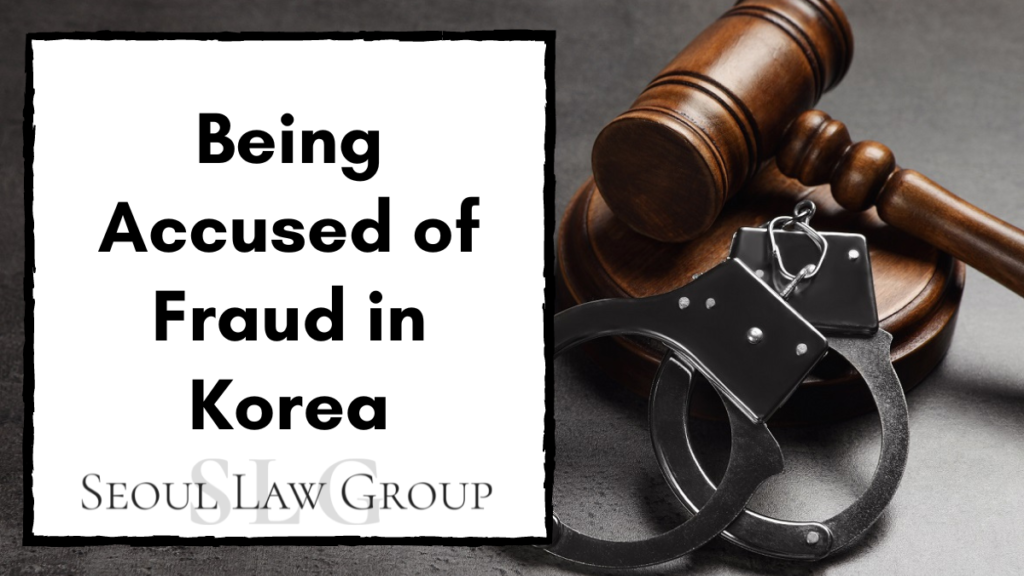Being Accused of Fraud in Korea
What if one day, you receive a letter stating that you have been accused of fraud in Korea? What steps do you take, and what do you need to do to prove your innocence? Although we hope this never happens to you, we want to make sure that if it does, you know exactly what you are accused of, and what you need to do. This article provides an overview of what Korean law considers fraud, and what happens if you are accused.

One tip we can already give you: hire an English-speaking lawyer as soon as possible after the accusation. English-speaking lawyers in Korea can help you navigate the civil or criminal process effectively, while keeping you up-to-date with everything you need to know.
Table of Contents
Definition of Fraud in Korea
As we already looked over in the previous article, to establish “fraud” as a crime, the following four requirements must be met.
- You must “deceive” the victim. “Deceiving” means misleading another person by falsely representing facts.
- The victim must “dispose” of their property or other legal rights (“act of disposal”) as a result of the deception.
- You must obtain “property or pecuniary advantage” as a result of the deception. Even if you lied, it is not a fraud if you did not get anything out of it.
- You must have an “intention” to commit fraud. Even if you lied, it is not a fraud if you didn’t know it was a lie, or you didn’t mean to get anything out of it.
Chapter XXXIX article 347 of the Criminal Act states the following punishment for fraud “A person who defrauds another, thereby taking property or obtaining pecuniary advantage from another, shall be punished by imprisonment for not more than ten years or by a fine not exceeding twenty million won.” In other words, if a fraudulent act is committed, the perpetrator might face up to 10 years in prison or could receive a heavy fine.
Korea also punishes fraud through online means, and fraud by taking advantage of people that have mental problems in similar ways. Attempted fraud can also be punished, and forcing someone else to defraud someone for you is also punishable by law. You can check our previous article about types of fraud and their punishments in Korea.
Examples of Fraud You Might Get Accused of
You should not only be careful not to be scammed, but also be careful not to be accused of fraud. There are a few examples of fraud that innocent people, especially foreigners, might get accused of in Korea. Let’s have a look.
1. Non-payment of Debt
It might look strange but borrowing another person’s money and not repaying the debt can be a fraud. Of course, it is NOT a fraud if you were able to repay the money at the time you borrowed it, but later you became unable to pay it back from sudden financial difficulty. However, if you never had the intention or ability to pay back the money from the beginning, and you “deceived” the victim as if you had the intention and ability to pay it back, it is a fraud.
Because of this, we recommend you beware if you are going through a financial difficulty and cannot pay your debt. Many debtors in Korea get accused of fraud by their angry creditors who demand their money back. The creditors claim that the debtors committed fraud, by deceiving them into lending the money, while the debtors argue that they did not.
2. Voice Phishing
Voice phishing is a fraud in which criminals call you (or text you) and pretend to be your bank or other financial or government institution. They then proceed to ask for personal information – such as your social security number, your bank account, your pin code, etc. This can lead to financial fraud or even identity theft. A good way of avoiding falling victim to voice phishing is never giving out any personal or identifiable information over the phone or in an email – unless you are 100% certain the institution you are communicating with is legitimate.
Voice phishing is one of the huge social issues in Korean society, not only for the victims but also for the people who get accused of this crime. People who urgently need a job, especially foreigners, often end up being unintentionally involved in voice phishing. The scammers trick them as if this is a legal job, and tell them to go to a certain place and collect money from someone, in reality they are collecting money from voice phishing victims.
3. Multi-level Marketing
Multi-level marketing, also called “network marketing” or “pyramid selling,” is a business system of selling goods in which each salesperson recruits further salespeople, resulting in a hierarchy in which each member receives returns from the sales made by those below them. Most of multi-level marketing are fraud, because they make false advertisements of their goods or promise higher returns than they actually get, in order to recruit new salespeople.
The main problem of this system is that, once you bought their goods, you should sell it to other people at an increased price to make your own profit, which means you are most likely end up committing fraud as well. So, if you buy their goods and become one of their salespeople, you would be a victim of their false marketing, but you would also become a perpetrator for the people you sold your goods. Some of the clients of Seoul Law Group are unfortunate people who had been accused of fraud or had been sued for damages because of this.
4. Other Forms of Fraud
There are many other forms of fraud, such as elder fraud, Ponzi schemes, business fraud, and more. For more information on the different kinds of fraud recognized by the FBI.

Being Accused of Fraud
We hope this never happens to you, but what if you get accused of fraud? It is very important to understand what is going on, and what your options are. In Korea, you can be accused of fraud through a civil case – where a victim directly accuses you and demands compensation for their damage – or through a criminal case – where the District Prosecutor’s Office prosecutes you. In a civil case, the punishment is limited to compensation set by the court, whereas in a criminal case the punishment can be a fine or a prison sentence.
The most important thing to do when being accused of fraud is to find an English-speaking lawyer as soon as possible. The Korean legal system is difficult to navigate for Koreans already, let alone for foreigners. You need a lawyer you can trust with making your case on your behalf. Seoul Law Group has qualified English-speaking lawyers that will make sure you get the best defence possible and that will keep you up-to-date with everyone going on in the process.
1. Civil Case
In a civil case, the victim directly sues the perpetrator. This can be done to get monetary compensation for the loss that they suffered. A civil case cannot lead to imprisonment, but it can also lead to debarment from bidding for government contracts for a period ranging from one month to two years.
When starting a civil case, a plaintiff (원고) claims to have incurred a loss due to the defendant’s (피고) fraudulent actions. As such, the plaintiff demands compensation from the defendant. The defendant has to respond to a plaintiff’s claims and has to show why he or she did not defraud the plaintiff.
If the claimed damages are less than 100 million won, the case shall be presided over by 1 judge. When the claimed amount is more than 100 million Korean won, the case will be heard by a panel of 3 judges. The defendant has 30 days to respond after the complaint has been submitted. During the hearings, both the plaintiff and defendant will submit evidence to show their innocence. As a defendant, it is very important to have concrete evidence that shows that you did not defraud the plaintiff After the hearings, the judge(s) will decide whether the plaintiff shall be granted compensation, and if yes, how much.
It is vital to have a good English-speaking lawyer to defend you during these civil cases. They can help you get evidence of innocence organized, and can present it to the judges in the most beneficial way. If you are deemed guilty, they can also help negotiate the compensation downward.
2. Criminal Case
If the victim report you to the police as a scammer, and the police investigate you and finds you likely to be guilty of fraud, a criminal case can be started by the District Prosecutor’s Office. During the investigation, the police can interview you, obtain evidence, or even arrest you.
If you are accused of fraud in a criminal case, you are up against the state, not against an individual. This means that the punishment differs too. If you are found guilty, you do not have to pay compensation, but instead, have to pay a heavy fine or be imprisoned for several months to years – or both.
Criminal cases can have huge ramifications for foreign residents in Korea, as they can also affect your visa status. That is why it is very important to hire an English-speaking lawyer as soon as you know that you are being prosecuted. They can help protect your rights whilst building the strongest defence they possibly can. They can also help you negotiate your sentence or fine.
All in all, we hope you do not get accused of fraud in either a civil or a criminal case. But now that if you do, you do have options to defend yourself and prove your innocence. It all starts with a good, competent lawyer that can communicate well with you!

Every weekend i used to pay a visit this website,
for the reason that i wish for enjoyment, as this this web site conations in fact nice funny material too.
Thank you for your kind words. If you require any assistance with your legal matters, please do not hesitate to reach out to us via email at info@seoullawgroup.com. We are here to assist you.
Everything is very open and very clear explanation of issues. was truly information. Your website is very useful. Thanks for sharing.
We appreciate your gracious words, and we remain committed to continuous improvement. If you ever have any legal inquiries in the future, please do not hesitate to contact us at info@seoullawgroup.com. We are here to assist you with any questions or concerns you may have. Thanks you for your support.
Some genuinely nice and useful info on this site, as well I conceive the design has got fantastic features.
We appreciate your gracious words, and we remain committed to continuous improvement. If you ever have any legal inquiries in the future, please do not hesitate to contact us at info@seoullawgroup.com. We are here to assist you with any questions or concerns you may have. Thanks you for your support.
i borrow money to my friend but she is asking 15% interest and sometimes i didnt pay on time she ask a penalty for how many days of delayed payment and now my debt is growing because of her interest and penalty …what should i do?
Hello, thank you for reaching out. We have sent an email in response and we look forward to hearing from you.